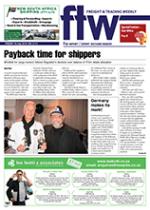This is your worst
nightmare – your
consignment is en route
and you get a call to say
that the truck has been
involved in an accident,
and that part of your cargo
has been damaged or
pilfered.
The first step is to
advise your insurer and all
other parties who have an
interest in the load as soon
as you become aware of the
incident. If at all possible,
send a replacement vehicle
to the scene together with
enough manpower required
to collect and reload onto
the replacement vehicle.
Rod Isaacs of Eikos
Risk Applications
explains the importance
of providing the required
documentation timeously:
“It is imperative that you
collate all of the necessary
trucking documents –
this includes the waybill/
vehicle manifest, supplier
invoices etc. Send these
together with your driver’s
statement to your marine
insurance broker as soon as
possible.”
Generally an insurer
will appoint a surveyor, so
remember to obtain the
name and contact details of
the transporter – this will
speed up the process as the
surveyor will get the facts
from the right person as
soon as possible.
It’s also wise to have your
driver tested for alcohol,
said Isaacs, even if there is
no third party involved –
and to report the incident
to the police even when no
other vehicle is involved.
The most important
thing to have in the
event of a potential
claim is common sense:
document everything, use
your broker’s expertise,
and overlook nothing.
Losses are expensive,
and that is exactly why
insurance exists – to
place you back in the
situation you were prior
to the loss. Remember,
if in any doubt, phone
your marine insurance
broker – they are there
to help. Don’t make any
decisions on disposal
or replacement of the
goods without consulting
your broker as this could
prejudice your rights
against your insurer.
TALKING INSURANCE
18 Jul 2014 - by Staff reporter
0 Comments
FTW - 18 Jul 14

18 Jul 2014
18 Jul 2014
18 Jul 2014
18 Jul 2014
18 Jul 2014
18 Jul 2014
18 Jul 2014
18 Jul 2014
18 Jul 2014
18 Jul 2014
18 Jul 2014
